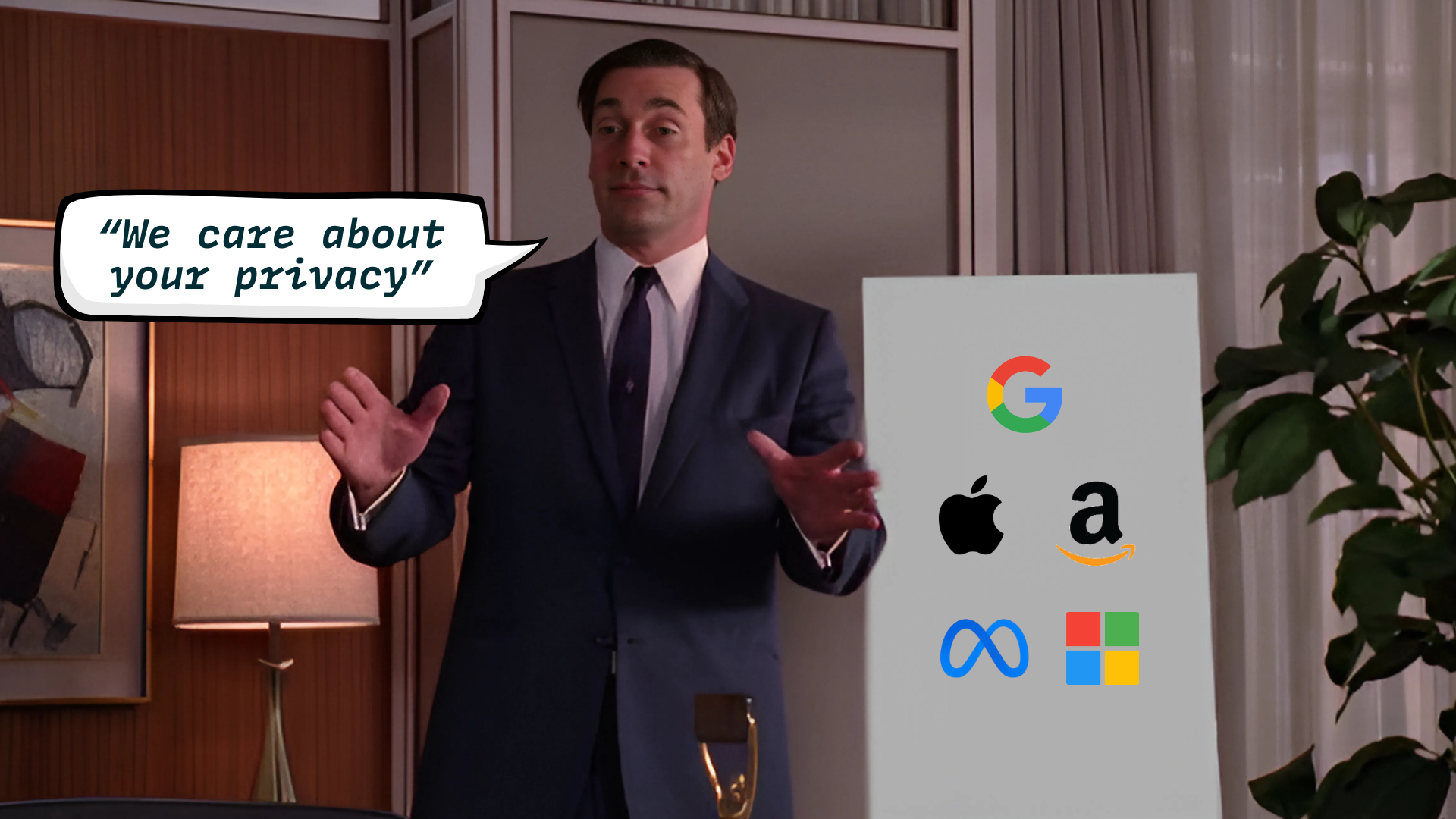Privacy Washing: Warum Big Tech sich nicht wirklich um Ihre Privatsphäre kümmert!
Willkommen im Zeitalter des Privacy Washing: Große Technologieunternehmen wie Google und Microsoft geben sich jetzt datenschutzfreundlich, aber das ist nur eine Fassade. Was ist Privacy Washing und warum geschieht es? Wir erklärens!
Was ist Privacy Washing?
Privacy Washing ist eine Marketingtaktik, die häufig von großen Technologieunternehmen eingesetzt wird, die Ihnen weismachen wollen, dass sie Ihre Daten und Ihre Privatsphäre respektieren. Aber in Wirklichkeit schützen sie die Daten der Nutzer nicht wirklich und respektieren die Privatsphäre der Nutzer nicht, wie behauptet. Unternehmen wie Google, Meta, Microsoft und Apple haben ihre Marketingstrategien perfektioniert, um den Anschein zu erwecken, dass sie sich sehr um den Schutz der Privatsphäre bemühen, indem sie behaupten, dass die Nutzer an erster Stelle stehen und sie die “Kontrolle” über ihre Datenschutz-Einstellungen haben. Schaut man sich jedoch das Kleingedruckte an, stellt sich oft heraus, dass diese Technologieunternehmen dem Nutzer nur geringe Möglichkeiten geben, den Umfang der Datenerfassung anzupassen. Selbst wenn Sie alle Datenschutzeinstellungen auf Maximum stellen (was Sie manuell tun müssen), können diese Unternehmen immer noch Ihre Daten sammeln. Das ist Privacy Washing.
Warum gibt es Privacy Washing?
Es gibt viele Gründe dafür, dass Unternehmen Privacy Washing betreiben, von der Forderung nach strengeren Datenschutzbestimmungen zum Schutz der Nutzer von Online-Plattformen bis hin zu einem wachsenden Bewusstsein der Internetnutzer dafür, wie ihre Daten von den Tech-Giganten zu Gewinnzwecken missbraucht werden. Im Folgenden gehen wir auf einige der häufigsten Gründe ein, aus denen Unternehmen “Privacy Washing” als Marketingstrategie einsetzen.
Strengere Vorschriften zum Datenschutz
Mit der Verschärfung der Datenschutzrichtlinien durch die Gesetzgeber auf der ganzen Welt, z. B. der EU-Datenschutzgrundverordnung (DSGO), können Tech-Giganten wie Meta und Google Nutzerdaten nicht mehr wie früher sammeln und verarbeiten. Aufgrund der geltenden Vorschriften sind diese Unternehmen gezwungen, dem Nutzer über die Datenschutzeinstellungen mehr (aber immer noch begrenzte) Wahlmöglichkeiten zu geben. Diese erzwungenen Aktualisierungen werden als tolle Verbesserungen für die Nutzer dargestellt, obwohl die Technologieunternehmen es vorziehen würden, weiterhin alle möglichen Daten zu verwenden und zu missbrauchen. Und auch wenn es Vorschriften gibt, finden die Unternehmen immer noch Schlupflöcher, um Nutzerdaten zu sammeln und zu verarbeiten.
Große Tech-Skandale und wachsendes Bewusstsein
In den letzten Jahren sind viele Skandale und Datenschutzverletzungen bei großen Technologieunternehmen ans Licht gekommen, und allmählich wird den Menschen auf der ganzen Welt klar, dass ihre Online-Aktivitäten nicht so geschützt und nicht so privat sind, wie die Tech-Giganten uns glauben machen wollen. Diese Skandale haben nicht nur negative Auswirkungen für die betroffenen Unternehmen durch den Verlust von Ansehen, Nutzern und Gewinnen, sondern sie veranlassen die Menschen auch dazu, den Dienst zu wechseln und ihr Verhalten online zu ändern. Perfekte Beispiele dafür sind die “DeGoogle-Bewegung” oder die “Choose European-Bewegung”.
Unternehmen wie Google, Microsoft und Meta sind aufgrund des zunehmenden Interesses an Privatsphäre und Datenschutz zu Meistermanipulatoren und Experten im Privacy Washing geworden. Das ist verständlich, denn sie müssen mit der Nachfrage der Nutzer nach besserem Datenschutz und mehr Privatsphäre Schritt halten. Während einige Menschen gut genug informiert sind, um zu wissen, was wirklich passiert, wenn sie Produkte großer Technologieunternehmen verwenden, können Kampagnen zum Schutz der Privatsphäre für den durchschnittlichen Internetnutzer sehr überzeugend sein.
Ihre Daten sind zu profitabel
So wie Öl- und Gasunternehmen oft wegen “Greenwashing” angeprangert werden, gilt das Gleiche für große Technologieunternehmen beim Privacy Washing. Unternehmen wie Facebook und Google geben sich als Verfechter des Datenschutzes aus, doch diese beiden Unternehmen sind ein Paradebeispiel für das Gegenteil, da sie den Großteil ihrer Gewinne weiterhin mit dem werbebasierten Geschäftsmodell erzielen. Durch das Sammeln möglichst vieler Nutzerdaten und deren Verkauf an Werbeunternehmen, die dann gezielt Werbung schalten, verdienen diese Unternehmen jedes Jahr Milliarden. Aber wenn die Haupteinnahmequelle eines Unternehmens die Werbung ist, ist das keineswegs datenschutzfreundlich für die Nutzer. Aus diesem Grund sind beliebte Dienste wie Facebook und Google “kostenlos”. Sie können mit Ihren Daten einfach viel mehr Geld verdienen, als wenn Sie für die Nutzung ihrer Dienste eine Gebühr verlangen würden.
Google’s Privacy Washing
Der Gewinnbericht von Alphabet für das Jahr 2024 zeigt, dass die Haupteinnahmequelle des Unternehmens im Jahr 2024 die Werbeeinnahmen sind. Ungefähr 264,59 Milliarden Dollar der insgesamt 350 Milliarden Dollar wurden durch Anzeigen generiert. Es ist also klar, dass Alphabet’s Google seine Milliarden mit Werbung, dem Sammeln von allem, was Sie online tun, und dem Verkauf Ihrer Daten verdient.
Solange die größte Einnahmequelle von Google jedoch die Werbung ist, ist es äußerst unwahrscheinlich, dass das Unternehmen aufhört, Nutzerdaten zu sammeln und zu verkaufen. Stattdessen wird das Unternehmen immer mehr Tracking einführen, zum Beispiel den digitalen Fingerabdruck oder die Integration von Gemini AI in Gmail. Gleichzeitig möchte Google mit Kampagnen zum Schutz der Privatsphäre seine Nutzer davon überzeugen, dass sie die Kontrolle über ihre Daten hätten.
Ein Paradebeispiel für das Waschen der Privatsphäre ist der Meinungsartikel von Sundar Pichai in der New York Times, in dem er eine sehr emotionale, herzliche Geschichte schreibt, in der er Beispiele dafür anführt, wie sich die Produkte von Google verändern, um den Nutzern mehr Optionen zu bieten, und er geht sogar so weit zu sagen
”Unsere Mission zwingt uns dazu, den gleichen Ansatz für den Datenschutz zu wählen. Für uns bedeutet das, dass Datenschutz kein Luxusgut sein darf, das nur Menschen angeboten wird, die es sich leisten können, Premiumprodukte und -dienste zu kaufen."
"Privatsphäre muss für alle Menschen auf der Welt gleichermaßen verfügbar sein.”
Im Fall von Google ist die Privatsphäre nicht gegeben oder für jeden auf der Welt gleichermaßen verfügbar, und solange der Tech-Riese aus dem Silicon Valley seine Einnahmen mit Werbung erzielt, können Privatsphäre und Datenschutz nicht das Hauptanliegen des Unternehmens sein. Für viele Menschen, die nicht wissen, was Google wirklich tut, würde die Lektüre eines solchen Meinungsartikels den Eindruck erwecken, dass Google sich wirklich kümmert und seinen Teil zum Schutz der Daten beiträgt - dies wird durch die Tatsache, dass der Artikel in der New York Times erschienen ist, nur noch untermauert.
Lassen Sie sich nicht täuschen: Sie haben nicht die Kontrolle
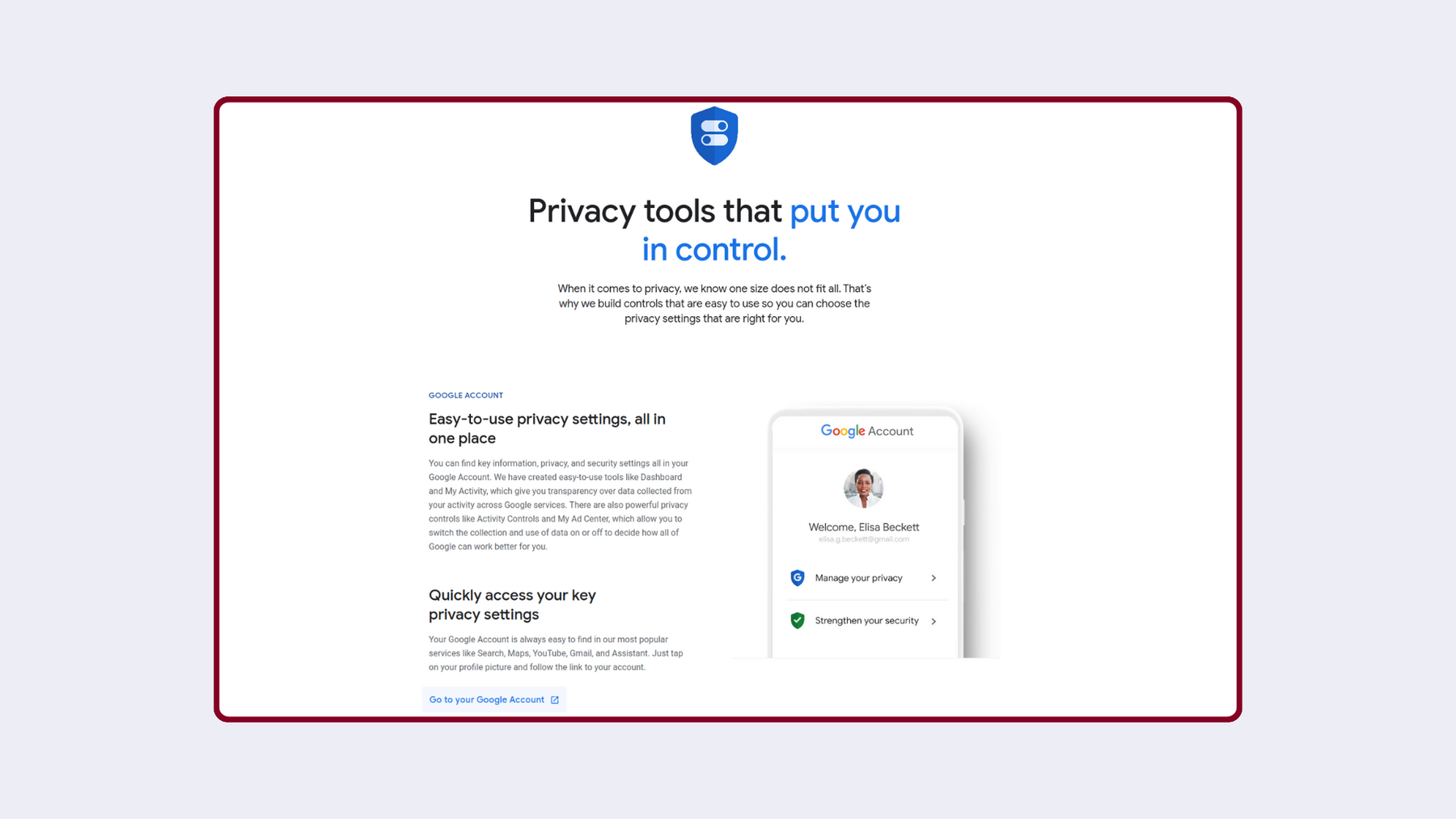

Die Datenschutz-Tools von Google sind das perfekte Beispiel für Privacy Washing. Diese Tools erwecken den Eindruck, dass Sie die Kontrolle haben und Ihre Daten schützen können. Aber in Wirklichkeit werden Sie, solange Sie Google-Produkte verwenden, immer verfolgt und Ihre Daten werden gesammelt. Sie können nur das Ausmaß dieser Verfolgung einschränken.
Googles Datenschutz-Tools
Durch die Verwendung von Google-Produkten gestatten Sie Google im Wesentlichen, Ihre Daten zu sammeln. Aber natürlich würde Google Sie nie darüber informieren oder Ihnen die Fakten offenlegen. Stattdessen hat es ein “Sicherheitszentrum” eingerichtet, in dem Sie “Datenschutzkontrollen” finden können. Dies ist eine spezielle Seite, die Ihnen zeigt, wie Sie Ihre Datenschutzeinstellungen nach Ihren Wünschen ändern können. Das Problem dabei ist, wenn Sie die Datenschutz- und Sicherheitseinstellungen nicht ändern, dass Google dann so viele Ihrer Daten wie möglich sammelt. Und wie wir von ähnlichen Wahlmöglichkeiten wissen, z. B. von dem Beispiel, als Apple aufgrund der europäischen DMA den Menschen aktiv die Option anzeigen musste, den Standardbrowser auf iPhones zu ändern, haben die meisten Menschen ihre Standardeinstellungen nicht geändert.
Eine vom Microsoft-Forschungsteam durchgeführte Studie untersuchte, wie viele Word-Nutzer ihre Einstellungen änderten, und fand heraus, dass mehr als 95 % der Microsoft-Nutzer keine Einstellungen geändert hatten. Dies zeigt, dass Microsoft in diesem Fall die Standardeinstellungen wählen konnte, ohne dass die Mehrheit der Benutzer sie änderte; das Gleiche gilt für viele andere technische Produkte.
Was also die Datenschutzeinstellungen von Google betrifft, so können Sie zwar die Erfassung jedes einzelnen YouTube-Videos, das Sie jemals angesehen haben, deaktivieren oder die Personalisierung von Anzeigen abschalten, aber das wird Google nicht davon abhalten, Ihnen Anzeigen auf YouTube zu zeigen. Und selbst wenn Sie das Tracking deaktivieren, was kaum jemand tut, kann Google immer noch Daten sammeln und Sie mit Anzeigen ansprechen.
Deshalb muss der Datenschutz die Standardeinstellung sein. Alles andere ist Privacy Washing.
Google Gemini AI
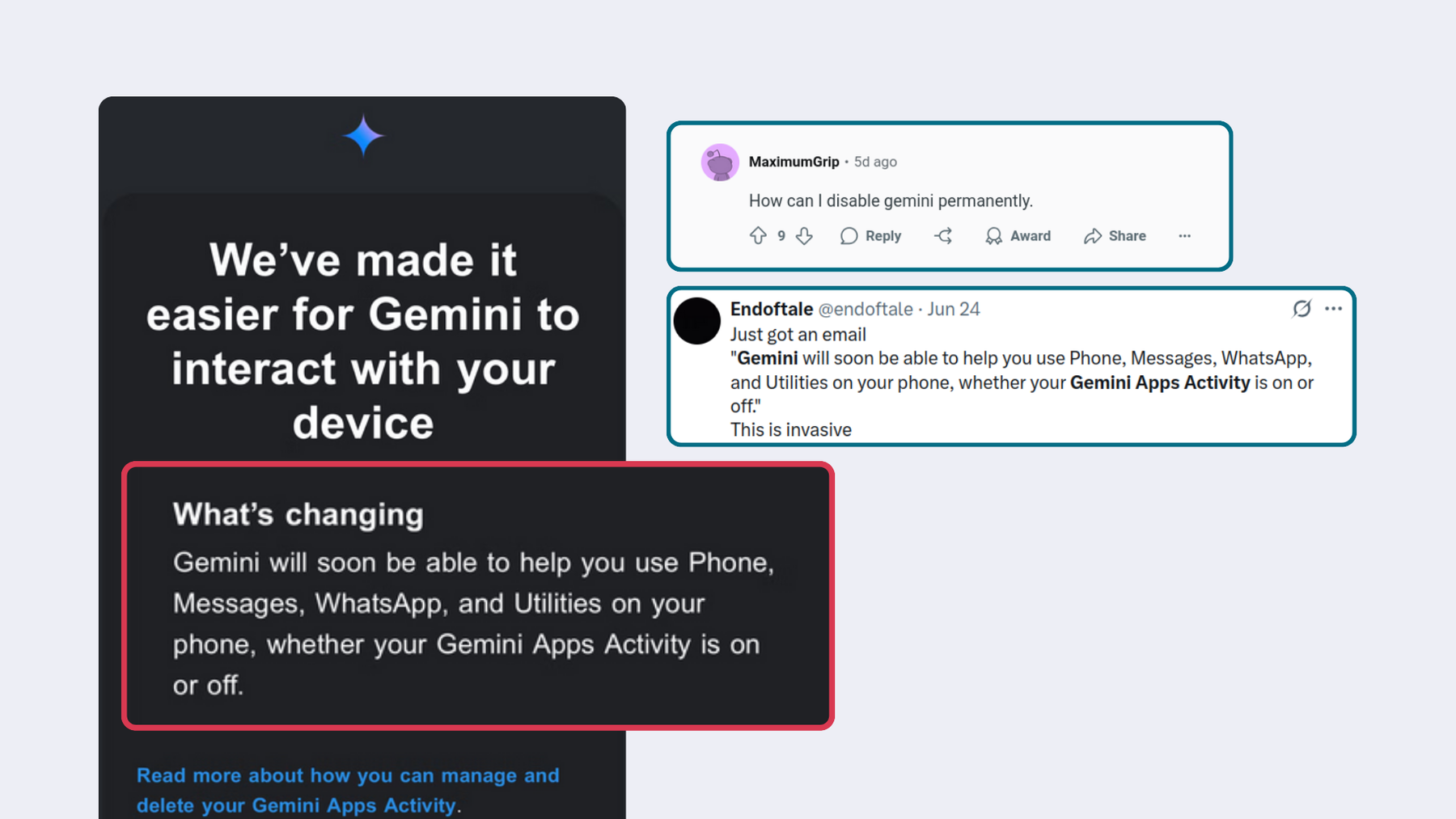

Googles Entscheidung, Gemini AI in WhatsApp, Phone, Messages und Utilities von Android-Nutzern einzuführen, stellt ein Risiko für die Privatsphäre der Nutzer dar.
Wie andere Technologieunternehmen konkurriert auch Google darum, mit Gemini AI das beste und fortschrittlichste KI-Modell zu entwickeln. Dazu muss es jedoch mit Nutzerdaten trainiert werden. Jetzt aktiviert Google die Gemini-KI für Android-Nutzer mit der Behauptung, sie würde “die Produktivität steigern” und “die Dinge einfacher machen”. So hat Google vor kurzem ein Update durchgeführt, das Gemini-KI auf Android-Geräten aktiviert wurde, um in Apps wie WhatsApp und Nachrichten zu helfen, selbst wenn die Nutzer zuvor die Gemini-App-Aktivität deaktiviert hatten. Ein weiteres Beispiel für das Privacy Washing ist die Einführung von Gemini in Gmail, das als netter kleiner Helfer vermarktet wird, aber in Wirklichkeit ein Alptraum für die Privatsphäre ist.
Google Inkognito-Modus
Die Klage gegen den Inkognito-Modus von Google ist ein weiteres gutes Beispiel für Privacy Washing. Unzählige Google Chrome-Nutzern auf der ganzen Welt hatten den Eindruck, dass sie beim Surfen im Internet mit dem Inkognito-Modus ihre Privatsphäre schützen können. Leider war dies nicht der Fall. Es wurden zwar keine Surfaktivitäten auf dem Gerät gespeichert, aber Google sammelte und speicherte dennoch die Daten seiner Nutzer. Im Jahr 2020 reichten Google-Nutzer eine Klage gegen Google ein, die dazu führte, dass das große Technologieunternehmen zustimmte, die über die Jahre gesammelten Browserdaten der Nutzer im Wert von 5 Milliarden Dollar zu löschen oder zu de-identifizieren. Dies unterstreicht einmal mehr die Datenschutz-Illusion von Google.
Microsoft Privacy Washing
Microsoft ist ein weiteres Unternehmen, das neue Funktionen und Tools einführt, um Teams zu unterstützen und die Produktivität zu steigern, aber in Wirklichkeit sind diese neuen Funktionen oft ein Risiko für den Datenschutz. Noch besorgniserregender ist, dass Microsoft von Regierungen und Unternehmen auf der ganzen Welt genutzt wird, aber das ändert sich langsam.
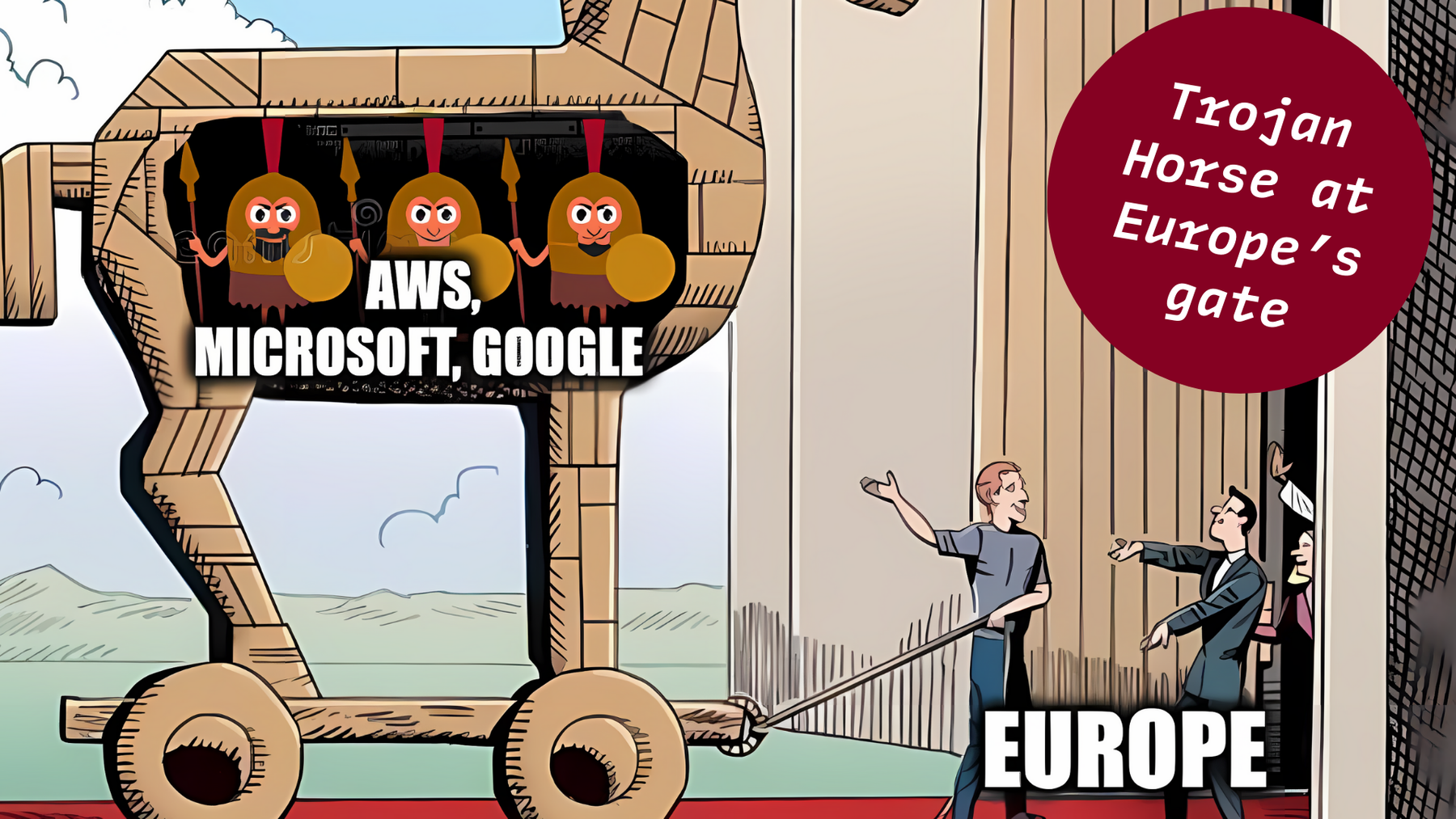

Mit einem Vorstoß für digitale Souveränität in Europa vermarktet Microsoft seine Sovereign Cloud.
Microsofts Sovereign Cloud
In Europa war Microsoft traditionell der bevorzugte Anbieter für Regierungen und Unternehmen. Mit dem neuen Trend zur digitalen Souveränität wollen Unternehmen nun souveräne Lösungen einsetzen und sich von Anbietern in amerikanischem Besitz abwenden. Als Reaktion darauf vermarktet Microsoft nun die Microsoft Sovereign Cloud als sichere Cloud-Lösung für europäische Unternehmen. Doch ähnlich wie beim Privacy Washing handelt es sich dabei nur um “Sovereign Washing”: Auch wenn Microsoft seine Daten in europäischen Rechenzentren speichert, kann die US-Regierung auf die Daten zugreifen.
Microsofts “neues Outlook”
Im Jahr 2022 führte Microsoft das “neue Outlook” ein, das mit erheblichen Datenschutzproblemen verbunden ist. Mit dem neuen Outlook werden die Anmeldedaten und E-Mails der Benutzer automatisch auf den Cloud-Servern von Microsoft gespeichert. Dies verstößt möglicherweise gegen Datenschutzgesetze und führt zu Rechts- und Compliance-Problemen. Außerdem erhöht sich das Risiko eines unbefugten Zugriffs auf vertrauliche Daten.
Microsoft-Recall
”Microsoft Recall” ist eine neue KI-Funktion, die in Windows 11 Copilot eingeführt wurde. Es handelt sich um eine weitere Funktion von Microsoft, die als produktivitätssteigernd verkauft wird, was aber keineswegs die ganze Wahrheit ist. Das neue KI-Tool speichert alle paar Sekunden Screenshots des Bildschirms des Benutzers, wenn Änderungen vorgenommen werden, einschließlich sensibler E-Mails und Nachrichten. Datenschutzexperten haben dazu aufgerfuen, diese “Microsfot Rcall” zu deaktivieren, da sie die Privatsphäre und die Vertraulichkeit der Nutzer untergräbt.
Meta Privacy Washing
Meta, die Muttergesellschaft hinter den sozialen Plattformen Facebook und Instagram, ist im Laufe der Jahre wegen der Art und Weise, wie sie Nutzerdaten sammelt, verarbeitet und nutzt, in die Kritik geraten. Aufgrund seiner zweifelhaften Erfolgsbilanz und der ständigen Gerichtsverfahren ist Meta ein weiterer Tech-Gigant, der das Privacy Washing durch die Vermarktung neuer “Datenschutzfunktionen” für seine Produkte betreibt. Aber wie Google macht auch Meta den Großteil seines Gewinns mit dem Sammeln von Daten und dem Verkauf von Werbung. Im Folgenden gehen wir kurz auf einige Beispiele für Metas Privacy Washing ein.
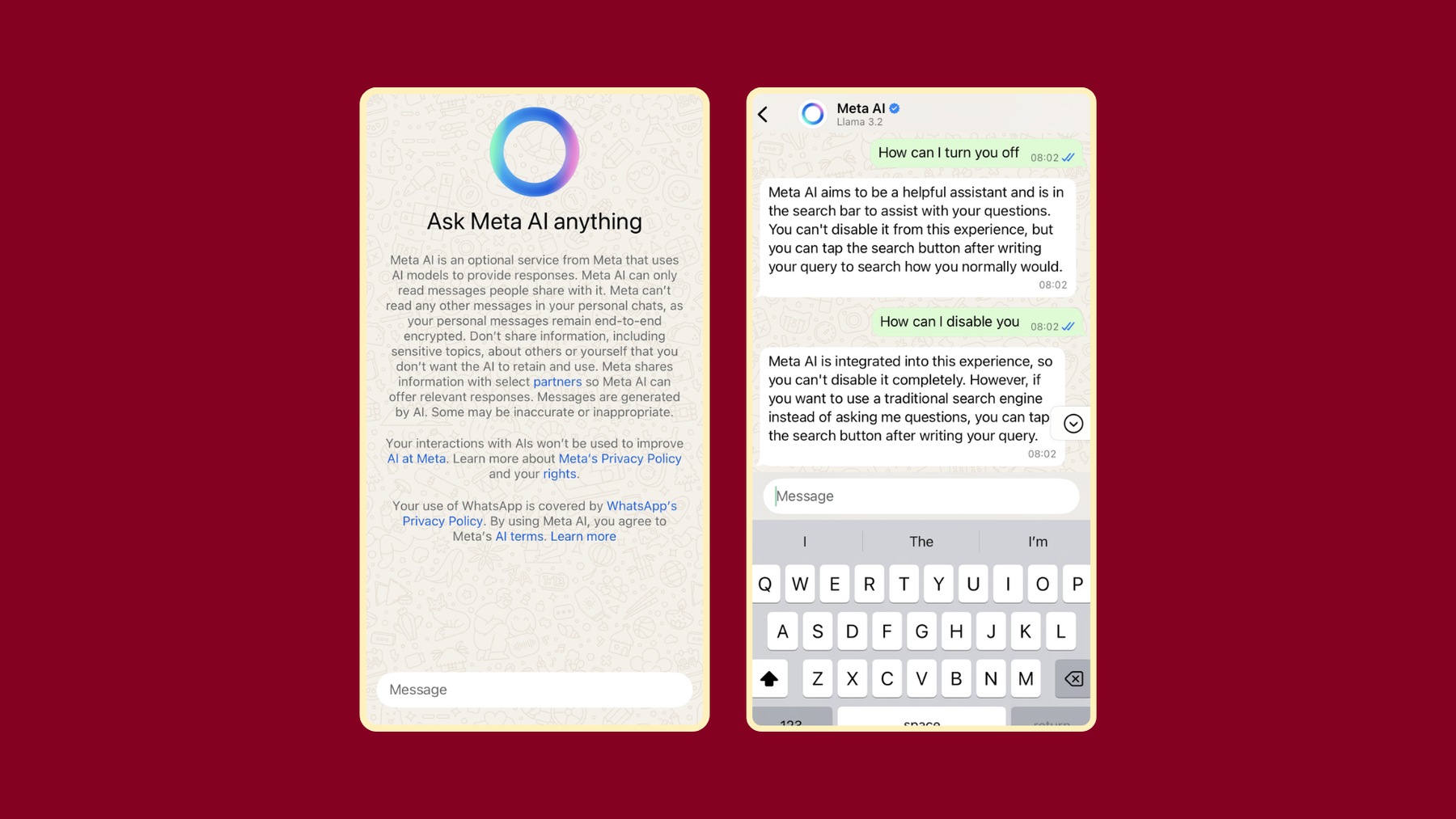

Metas plötzliche Einführung von Meta AI in WhatsApp ist ein weiteres Datenschutzproblem. Die Nutzer wurden nicht gefragt, ob sie zustimmen, und der KI-Bot kann nicht deaktiviert oder abgeschaltet werden.
Meta AI
Es ist keine Überraschung, dass Meta auch sein KI-Tool, Meta AI, entwickelt. Wie Google trainiert auch Meta seine KI-Modelle auf der Grundlage der großen Menge an persönlichen Daten, die es sammelt. Dazu gehören auch die Daten von Facebook- und Instagram-Nutzern in der EU, auch wenn dies die DSGVO verletzen könnte.
Meta AI wird in alle Meta-Produkte integriert, von einer eigenständigen Meta AI-App bis hin zur Integration des AI-Bots in WhatsApp und Instagram. Und der Tech-Gigant vermarktet seine KI-Integration sehr geschickt - sie wird als persönlich und hilfreich dargestellt. Sehen wir uns zum Beispiel diesen Text auf der Meta AI-Website an: “Öffnen Sie die Meta AI-App und fangen Sie an zu sprechen, um maßgeschneiderte Antworten, Ratschläge und Inspirationen zu erhalten…” Das mag zwar viele ansprechen, aber in Wirklichkeit werden durch die Nutzung von Meta AI Ihre Daten auf viele verschiedene Arten gesammelt und verarbeitet, ohne dass der Nutzer davon etwas mitbekommt.
Ein weiteres Problem für den Datenschutz ist, wie und wo Meta AI eingesetzt wird. Man denke nur an die überraschende Freigabe von Meta AI in WhatsApp. Meta-Benutzer wurden nicht gefragt, ob sie sich für den KI-Bot in WhatsApp entscheiden wollen, und es gibt auch keine Möglichkeit, die KI zu deaktivieren oder abzuschalten, was die Frage aufwirft, ob WhatsApp-Nachrichten wirklich privat sind.
Wenn Sie einer von vielen sind, die WhatsApp verlassen möchten, werfen Sie einen Blick auf diese privaten WhatsApp-Alternativen.
In den letzten Jahren hat auch Instagram Funktionen eingeführt, um die Privatsphäre der Nutzer zu verbessern, wie Instagram Teen Accounts. Letztes Jahr führte Meta diese eingeschränkten Konten für Nutzer unter 18 Jahren ein, um die Privatsphäre, das Wohlbefinden und die Sicherheit seiner jugendlichen Nutzer zu verbessern. Die Einführung dieser Teenager-Konten erfolgte, nachdem Frances Haugen Forschungsergebnisse veröffentlicht hatte, aus denen hervorging, dass das Unternehmen wusste, dass Instagram das Körperbild von Teenagern verschlechtern könnte. Noch beunruhigender ist, dass dies nicht das erste Mal war, dass Meta wegen seiner negativen Auswirkungen auf jugendliche Nutzer entlarvt wurde. Die Einführung von Meta Teens mag dazu beitragen, Teenager davor zu schützen, explizite Inhalte zu sehen, aber das bedeutet nicht, dass Meta aufgehört hat, ihre Daten zu sammeln, sie zu verfolgen und von ihren Daten zu profitieren. Dies unterstreicht eine weitere clevere Kampagne von Meta zum Privacy Washing: Diese Konten werden als perfekte Lösung für Teenager vermarktet, aber in Wirklichkeit sind die Teenager nur vor bestimmten Inhalten geschützt - aber ihre Privatsphäre wird nicht respektiert.
Threads
Threads, eine der neuesten Social-Media-Apps von Meta, ist eine weitere App, die so viele Nutzerdaten wie möglich sammelt. Innerhalb weniger Tage nach der Veröffentlichung hatte die Threads-App bereits 100 Millionen Nutzer, was bei Datenschutzexperten große Besorgnis auslöste, denn wie bei anderen Social-Media-Nutzern wussten auch bei Threads nur wenige über die riesigen Mengen an Informationen Bescheid, die die trendige soziale Website sammelt. Zu den Informationen, die gesammelt werden, gehören die ethnische Zugehörigkeit, die sexuelle Orientierung, biometrische Daten und sogar politische Meinungen, was angeblich aus Gründen der “Produktpersonalisierung” gerechtfertigt sind. Die Veröffentlichung der neuen App wurde in der EU sogar gestoppt, weil man befürchtete, dass sie die strengen europäischen Datenschutzbestimmungen nicht einhalten würde.
Auch Apple macht Privacy Washing
Es wäre unfair, nicht zu erwähnen, dass sich auch das angesehene Unternehmen Apple des Privacy Washings schuldig gemacht hat. Apple hat schnell erkannt, dass seine Konkurrenten in der Vergangenheit nicht auf den Datenschutz geachtet haben, obwohl sich die Menschen der Bedeutung des Online-Datenschutzes immer mehr bewusst wurden, und hat den Datenschutz zu einem wichtigen Schlüsselwort in seinen Marketingkampagnen gemacht.
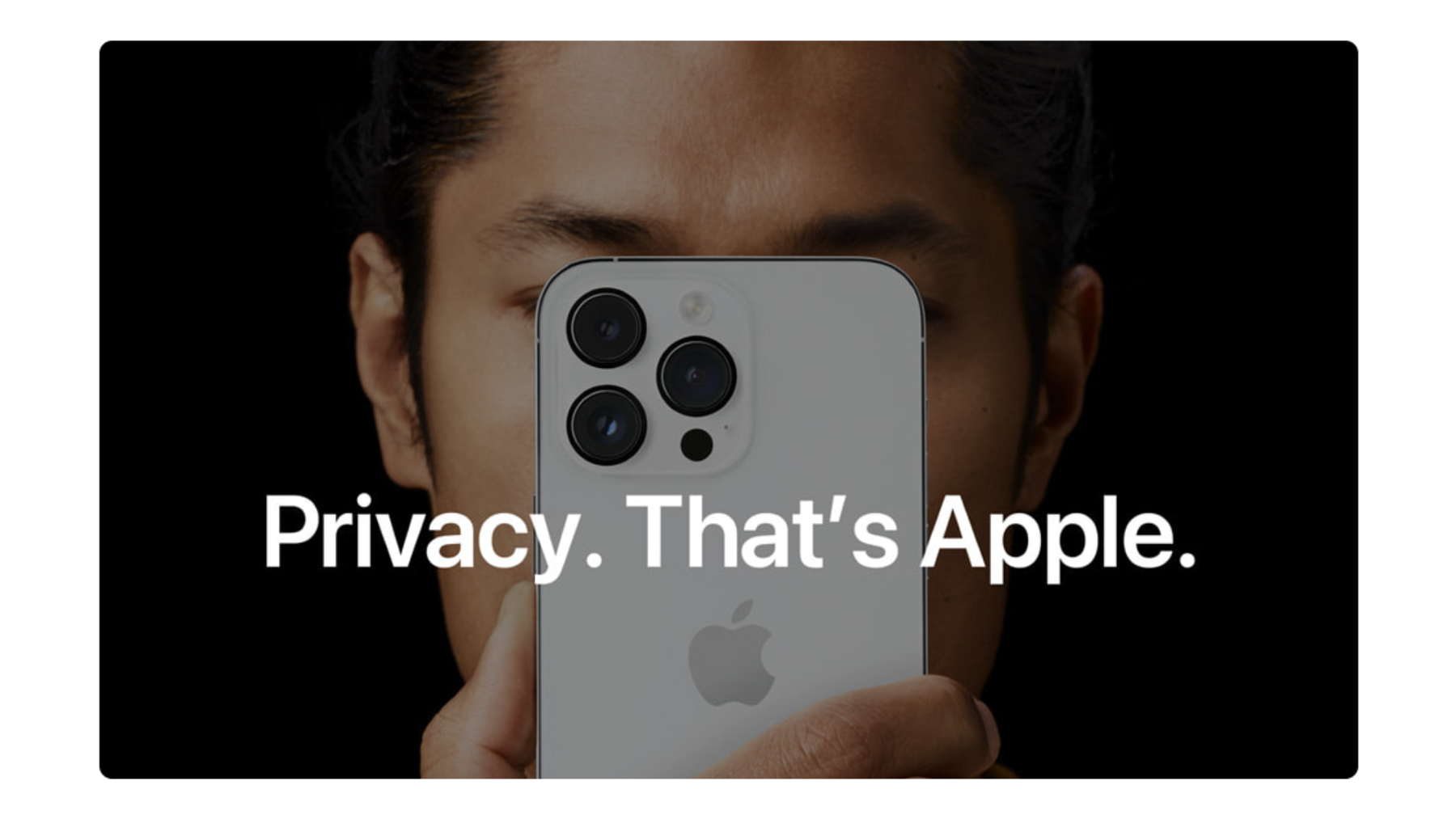

Apple bietet zwar einige gute Datenschutzfunktionen an, um Ihre Daten vor Dritten zu schützen, aber es ist ein weiteres Unternehmen, das seine Kampagnen zum Schutz der Privatsphäre perfektioniert hat.
Apple vermarktet sich selbst und sein Vorzeigeprodukt, das iPhone, als “privacy-first”. Und während Apple andere Technologieunternehmen, z. B. Meta’s Facebook, recht gut darin einschränkt, Nutzer auf iPhones zu verfolgen, verfolgt Apple selbst gerne seine Nutzer. Apple verwendet diese Daten - genau wie Meta und Google - für das Wachstum seiner eigenen Produkte, z. B. Apple Music, den App Store, den Safari-Browser usw. Darüber hinaus ist Apple auch eines der größten Werbeunternehmen weltweit, man denke nur an die Apple-Werbung, die jedes Jahr Milliarden von Dollar an Gewinn einbringt. Dennoch muss dieser Tech-Gigant als “König und Königin des Datenschutzes” bezeichnet werden, denn Apple hat nicht das gleiche zweifelhafte Image wie Meta und Google, obwohl es diesen Unternehmen sehr ähnlich ist, wenn es um die Sammlung von Daten für Werbezwecke geht.
Was wir lernen
Es gibt noch viele weitere Fälle von Datenschutzverletzungen, die wir erwähnen könnten, aber für diesen Artikel haben wir die bekanntesten Beispiele herausgegriffen.
Aus den heutigen Taktiken zum Privacy Washing lernen wir, das, was Unternehmen sagen und tun, ist oft nicht dasselbe.
Die Macht des Marketings, insbesondere online, kennt keine Grenzen. Für den durchschnittlichen Internetnutzer sind die oben genannten Kampagnen zum Privacy Washing sehr verlockend. Aber was diese Tech-Giganten sagen, muss immer mit großer Vorsicht und Skepsis betrachtet werden.
Dennoch ist das Internet nicht dem Untergang geweiht, und Sie können aktiv etwas ändern, um sich online zu schützen und Ihre Daten und Ihre Privatsphäre zurückzuerobern. Es gibt datenschutzorientierte Unternehmen wie Tuta, die dafür kämpfen, das Internet zu einem besseren Ort zu machen und es jedem zu ermöglichen, das Internet frei und in voller Privatsphäre zu nutzen.
Weitere Ressourcen zum Thema Datenschutz finden Sie in unserem Blog in der Rubrik Datenschutzratgeber. Seien Sie versichert, dass die von uns empfohlenen Datenschutz-Tools Sie nicht mit überzeugenden Privacy-Washing-Kampagnen hinters Licht führen werden.
Wenn es um Sicherheit und den Schutz Ihrer Daten geht, sollten Sie sich nicht mit weniger zufrieden geben.

